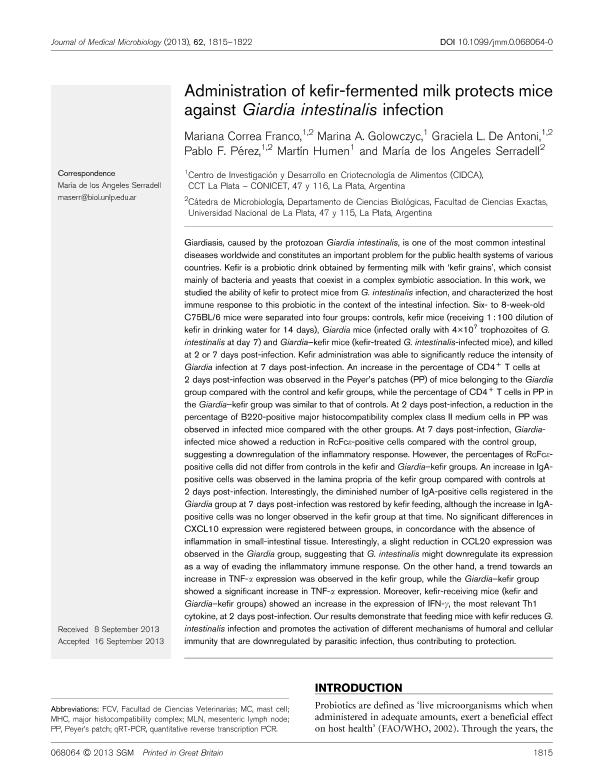Artículo
Administration of kefir-fermented milk protects mice against Giardia intestinalis infection
Correa, Mariana ; Golowczyc, Marina Alejandra
; Golowczyc, Marina Alejandra ; de Antoni, Graciela L.; Perez, Pablo Fernando
; de Antoni, Graciela L.; Perez, Pablo Fernando ; Humen, Martin Andres
; Humen, Martin Andres ; Serradell, Maria de Los Angeles
; Serradell, Maria de Los Angeles
 ; Golowczyc, Marina Alejandra
; Golowczyc, Marina Alejandra ; de Antoni, Graciela L.; Perez, Pablo Fernando
; de Antoni, Graciela L.; Perez, Pablo Fernando ; Humen, Martin Andres
; Humen, Martin Andres ; Serradell, Maria de Los Angeles
; Serradell, Maria de Los Angeles
Fecha de publicación:
12/2013
Editorial:
Society For General Microbiology
Revista:
Journal Of Medical Microbiology
ISSN:
0022-2615
Idioma:
Inglés
Tipo de recurso:
Artículo publicado
Clasificación temática:
Resumen
Giardiasis, caused by the protozoan Giardia intestinalis, is one of the most common intestinal diseases worldwide and constitutes an important problem for the public health systems of various countries. Kefir is a probiotic drink obtained by fermenting milk with ‘kefir grains’, which consist mainly of bacteria and yeasts that coexist in a complex symbiotic association. In this work, we studied the ability of kefir to protect mice from G. intestinalis infection, and characterized the host immune response to this probiotic in the context of the intestinal infection. Six- to 8-week-old C75BL/6 mice were separated into four groups: controls, kefir mice (receiving 1 : 100 dilution of kefir in drinking water for 14 days), Giardia mice (infected orally with 4107 trophozoites of G. intestinalis at day 7) and Giardia–kefir mice (kefir-treated G. intestinalis-infected mice), and killed at 2 or 7 days post-infection. Kefir administration was able to significantly reduce the intensity of Giardia infection at 7 days post-infection. An increase in the percentage of CD4+ T cells at 2 days post-infection was observed in the Peyer’s patches (PP) of mice belonging to the Giardia group compared with the control and kefir groups, while the percentage of CD4+ T cells in PP in the Giardia–kefir group was similar to that of controls. At 2 days post-infection, a reduction in the percentage of B220-positive major histocompatibility complex class II medium cells in PP was observed in infected mice compared with the other groups. At 7 days post-infection, Giardiainfected mice showed a reduction in RcFce-positive cells compared with the control group, suggesting a downregulation of the inflammatory response. However, the percentages of RcFcepositive cells did not differ from controls in the kefir and Giardia–kefir groups. An increase in IgApositive cells was observed in the lamina propria of the kefir group compared with controls at 2 days post-infection. Interestingly, the diminished number of IgA-positive cells registered in the Giardia group at 7 days post-infection was restored by kefir feeding, although the increase in IgApositive cells was no longer observed in the kefir group at that time. No significant differences in CXCL10 expression were registered between groups, in concordance with the absence of inflammation in small-intestinal tissue. Interestingly, a slight reduction in CCL20 expression was observed in the Giardia group, suggesting that G. intestinalis might downregulate its expression as a way of evading the inflammatory immune response. On the other hand, a trend towards an increase in TNF-a expression was observed in the kefir group, while the Giardia–kefir group showed a significant increase in TNF-a expression. Moreover, kefir-receiving mice (kefir and Giardia–kefir groups) showed an increase in the expression of IFN-c, the most relevant Th1 cytokine, at 2 days post-infection. Our results demonstrate that feeding mice with kefir reduces G. intestinalis infection and promotes the activation of different mechanisms of humoral and cellular immunity that are downregulated by parasitic infection, thus contributing to protection.
Palabras clave:
Giardia Intestinalis
,
Kefir-Fermented Milk
,
Infection
,
Protetion
Archivos asociados
Licencia
Identificadores
Colecciones
Articulos(CIDCA)
Articulos de CENTRO DE INV EN CRIOTECNOLOGIA DE ALIMENTOS (I)
Articulos de CENTRO DE INV EN CRIOTECNOLOGIA DE ALIMENTOS (I)
Citación
Correa, Mariana; Golowczyc, Marina Alejandra; de Antoni, Graciela L.; Perez, Pablo Fernando; Humen, Martin Andres; et al.; Administration of kefir-fermented milk protects mice against Giardia intestinalis infection; Society For General Microbiology; Journal Of Medical Microbiology; 2013; 62; 12-2013; 1815-1822
Compartir
Altmétricas



